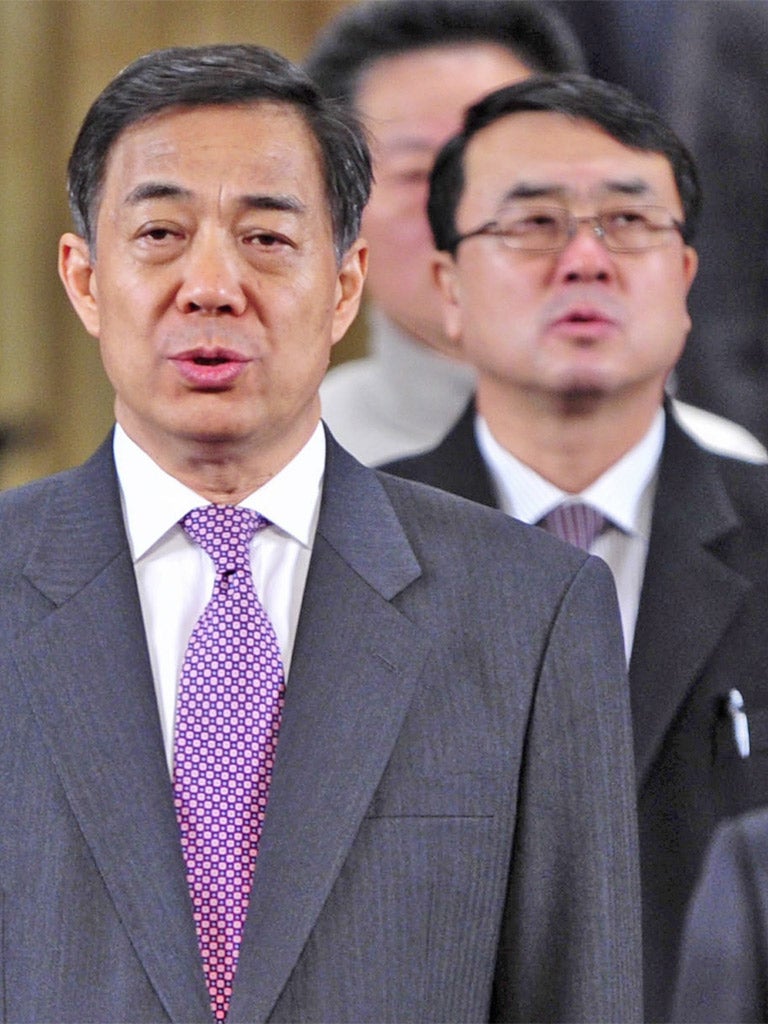Former police chief in Bo Xilai case to be tried for abuse of power
Protégé of purged leader faces charges as party tries to bolster legitimacy before leadership change

Your support helps us to tell the story
From reproductive rights to climate change to Big Tech, The Independent is on the ground when the story is developing. Whether it's investigating the financials of Elon Musk's pro-Trump PAC or producing our latest documentary, 'The A Word', which shines a light on the American women fighting for reproductive rights, we know how important it is to parse out the facts from the messaging.
At such a critical moment in US history, we need reporters on the ground. Your donation allows us to keep sending journalists to speak to both sides of the story.
The Independent is trusted by Americans across the entire political spectrum. And unlike many other quality news outlets, we choose not to lock Americans out of our reporting and analysis with paywalls. We believe quality journalism should be available to everyone, paid for by those who can afford it.
Your support makes all the difference.Wang Lijun, the former police chief in Chongqing and one-time protégé of Bo Xilai, the purged Communist leader, has been charged with defection, abuse of power and taking bribes in the latest development in China's biggest political scandal in decades.
The Bo Xilai scandal was largely sparked by Mr Wang's flight to the US consulate in Chengdu and his attempt to seek asylum in exchange for information about Mr Bo's wife, Gu Kailai, who was convicted in August of murdering the British businessman Neil Heywood. She was given a suspended death sentence after a brief trial.
"Wang Lijun, Chongqing's former vice mayor, has recently been charged with bending the law for selfish ends, defection, abuse of power and bribe-taking by the People's Procuratorate of Chengdu City, capital of south-west China's Sichuan Province," China's official Xinhua news agency said in a brief statement.
Mr Wang is a colourful character, known for carrying out his own post-mortem examinations and boasting of how he trained with the FBI and was kidnapped by the Italian mafia. His official title was deputy mayor, and he gained notoriety for a crackdown on gangs in Chongqing which he began at Mr Bo's behest. More than 1,500 people were arrested, including gangsters, prominent businessmen and 14 high-ranking officials.
The charges against Mr Wang come shortly before the conclusion of a brief visit to Beijing by Hillary Clinton, the US Secretary of State, and before a once-in-a-decade leadership transition in China in which President Hu Jintao and Premier Wen Jiabao will be replaced by Xi Jinping and Li Keqiang. The make-up of the all-powerful Standing Committee of the Politburo will also change, and fierce in-fighting has broken out as senior party members jostle for influence.
The state-run media have said the trials of Ms Gu and Mr Wang will strengthen people's faith in the legal system, a message aimed at bolstering the legitimacy of the ruling Communist Party before the leadership handover. But many have taken to the Twitter-style micro-blogging service Weibo, saying the trials are merely show trials intended to fool the people.
The leadership transition is traditionally a fraught time in Chinese politics, and the Communist Party is keen to get the Bo Xilai case cleared up before it happens. The handover is due to take place at the 18th Party Congress, which sources have said will be held from 15 to 18 October.
Four days after he was suddenly fired, Mr Wang sought sanctuary at the US Consulate in Chengdu, 200 miles away, and there he allegedly offered information to US officials on the Heywood case. At the consulate, Mr Wang allegedly accused Ms Gu of having a hand in Mr Heywood's death, according to reports.
The businessman's death went mostly unnoticed when it took place in November, and was believed to have resulted from a night of heavy drinking. But it eventually took centre stage in the high-profile scandal.
Mr Wang was removed from his post as gang-busting police chief in February. The Chongqing government said at the time that he was suffering from "immense mental stress and serious physical discomfort" and was receiving "vacation-style therapy". But by then the stage was set for Mr Bo's downfall.
Join our commenting forum
Join thought-provoking conversations, follow other Independent readers and see their replies
Comments